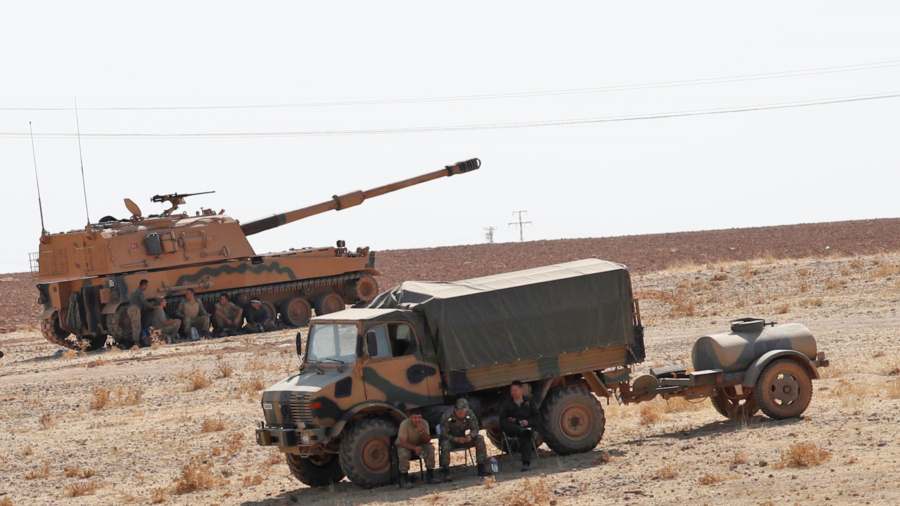BEIRUT/ISTANBUL—Women affiliated with ISIS and their children fled en masse from a camp where they were being held in northern Syria on Sunday after shelling by Turkish forces in a five-day-old offensive, the region’s Kurdish-led administration said.
Turkey’s cross-border attack in northern Syria against Kurdish forces widened to target the town of Suluk, which was hit by Ankara’s Syrian rebel allies. There were conflicting accounts on the outcome of the fighting.
Turkey is facing threats of possible sanctions from the United States unless it calls off the incursion. Two of its NATO allies, Germany and France, have said they are halting weapons exports to Turkey. The Arab League has denounced the operation.

Ankara launched the assault against the Kurdish YPG militia after U.S. President Donald Trump withdrew some U.S. troops from the border region. Ankara says the YPG is a terrorist group aligned with Kurdish militants waging an insurgency in Turkey.
Turkey’s stated objective is to set up a “safe zone” inside Syria to resettle many of the 3.6 million Syrian war refugees it has been hosting. President Recep Tayyip Erdogan has threatened to send them to Europe if the EU does not back his assault.
But the Turkish incursion has raised international alarm over large-scale displacements of civilians and, amidst the upheaval, the possibility of ISIS fighters escaping from prisons run by the Kurdish-led authorities.

The Kurdish-led forces have been the main regional ally of the United States against ISIS in Syria.
The region’s Kurdish-led administration said in a statement that 785 ISIS-affiliated foreigners had fled the camp at Ain Issa.
The Syrian Observatory for Human Rights, citing sources in the camp, said around 100 people had escaped.
In apparent reference to Turkish-backed rebels, the Kurdish-led administration said “mercenaries” attacked the camp where “Daesh elements”—a reference to ISIS—in turn attacked camp guards and opened the gates.
The Kurdish-led Syrian Democratic Forces (SDF) hold swathes of territory that was once part of ISIS’s claimed “caliphate.” The SDF has been keeping thousands of ISIS jihadists in jail and tens of thousands of their family members in camps.
SDF official Marvan Qamishlo told Reuters there were not have enough guards for the camp, which is north of Raqqa and about 20 miles south of the Turkish border.
“The guarding is very weak now,” he said, adding there were now just 60-70 security personnel at the camp compared with a normal level of no less than 700 in the camp of 12,000 people.

Turkish-Led Advance
Along the front lines, Turkish forces and Syrian rebels entered Suluk, some 6 miles from Turkey’s border, the Observatory said on Sunday.
Turkey’s state-owned Anadolu news agency said the rebels seized complete control of Suluk. But the SDF’s Qamishlo said SDF forces had repelled the attack and were still in control.
Suluk is southeast of the Syrian border town of Tel Abyad, one of the two main targets in the incursion, which was bombarded by Turkish howitzers on Sunday afternoon, a witness in the neighboring Turkish town of Akcakale said.
Machinegun fire resounded around the Syrian frontier town of Ras al Ain, 120 km (75 miles) to the east of Tel Abyad, while Turkish artillery continued to target the area, a Reuters reporter across the border in Turkey’s Ceylanpinar said.
Turkish-backed Syrian rebels, known as the National Army, advanced into Ras al Ain on Saturday but by Sunday there were still conflicting reports on which side was prevailing in the town.
The Syrian Observatory said the SDF, in which the YPG comprises the main fighting element, had recovered “almost full control” of Ras al Ain after a counter-attack.
A spokesman for the National Army denied this, saying its forces were still in the positions they took on Saturday.
130,000 Displaced
More than 130,000 people have been displaced from rural areas around Tel Abyad and Ras al Ain as a result of the fighting, the United Nations said on Sunday.
The U.N. Office for the Coordination of Humanitarian Affairs (OCHA) said it and other relief agencies estimated up to 400,000 civilians in the Syrian conflict zone may require aid and protection in the coming period.
Erdogan has dismissed the growing international condemnation of the military operation, saying Turkey “will not stop it, no matter what anyone says.”
In the latest criticism, British Prime Minister Boris Johnson told Erdogan the offensive may worsen the humanitarian situation and undermine progress toward weakening ISIS, urging an end to the operation.
Turkey’s Defence Ministry said on Sunday 480 YPG militants had been “neutralized” since the operation began, a term that commonly means killed. The SDF said 76 of its fighters have been killed.
The Observatory said 104 SDF fighters, 76 Turkey-backed rebels, and 52 civilians had been killed in the conflict.
In Turkey, 18 civilians have been killed in cross-border bombardment, Turkish media and officials say.
The SDF on Saturday urged the U.S.-led coalition to close air space to Turkish jets, saying SDF fighters were “being martyred by Turkish warplanes in front of the eyes of the allies.”
ISIS claimed responsibility for a car bomb on Friday in Qamishli, the largest city in the Kurdish-held area, where some ISIS fighters fled from a jail.

On Saturday Trump defended his decision to withdraw troops in the Syrian border region, telling conservative Christian activists that the United States should prioritize protecting its own borders.
“Let them have their borders, but I don’t think our soldiers should be there for the next 50 years guarding a border between Turkey and Syria when we can’t guard our own borders at home,” Trump said in a speech in Washington.
The SDF accused Turkey-backed rebels of killing a Kurdish politician in a road ambush on Saturday. The rebel force denied it, saying it had not advanced that far.
The Syrian Observatory said Turkey-backed groups had killed nine civilians on the road, including Hervin Khalaf, co-chair of the secular Future Syria Party.
By Tom Perry and Daren Butler


